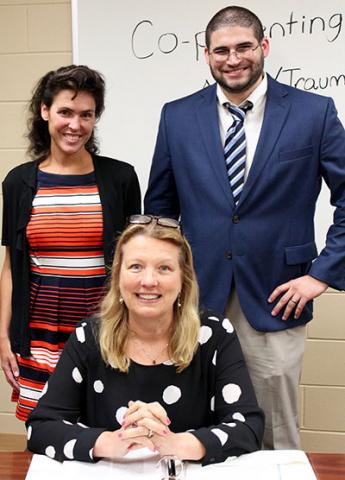FSU Team publishes new policy recommendation to make divorce training “trauma-informed”

Successful Co-Parenting After Divorce, an online FSU multidisciplinary training/research project housed in the Institute for Family Violence Studies at the College of Social Work, has presented a new policy recommendation asserting that co-parent education for divorcing parents should be “trauma-informed.” An article describing this research, “Trauma-Informed Co-Parenting: How A Shift in Compulsory Divorce Education to Reflect New Brain Development Research Can Promote Both Parents’ and Children’s Best Interests,” was published in the most recent edition of the University of Hawaii Law Review.
“Dozens of states, including Florida, require that parents going through divorce receive co-parent education,” explained Karen Oehme, Director of the Institute for Family Violence Studies and Principal Investigator for the large multidisciplinary project. “Our original online divorce training focused mainly on skill development and communication strategies, but we quickly began to identify barriers to these goals when we analyzed the data from voluntary parent surveys.”
One barrier identified by the team was the effect of adverse childhood experiences (ACEs) on co-parenting behaviors and attitudes. “Research on ACEs has demonstrated a link between a history of childhood trauma and a variety of physical and mental health issues,” said Anthony J. Ferraro, a doctoral candidate in the Department of Family and Child Sciences and a member of the Co-Parenting project team. “A history of ACEs may also have a negative impact on an adult’s intimate relationships and parenting interaction,” continued Ferraro, who will be an Assistant Professor at Kansas State University in the fall.
In the Hawaii Law Review, the authors describe prior research on ACEs and note that a high number of ACEs were reported by the parents who had taken the online training and answered the voluntary surveys attached to portions of the training. The article provides a review of existing and emerging research about the effects of ACEs on early brain development and subsequent impacts on health, behavior, and relationships in adulthood.
It also describes the team’s finding of a modest but statistically significant relationship between ACEs and co-parenting conflict: overall, as the number of ACEs increases, so does the conflict in the co-parenting relationship.
“We have so much more work to do on this issue,” observed Professor Nat Stern of the FSU College of Law, another team partner. Still, “the number of ACEs reported by these parents alone leads us to believe that they may benefit from learning about trauma and resilience.” Oehme agreed, “If the goal of mandatory co-parent education is to help children, then making co-parent education trauma-informed has been a missing link in dozens of statutory mandates in the United States.”
“A new trauma-informed approach could help break the cycle of trauma in families and help parents find ways to heal from their own trauma histories,” added Lisa S. Panisch, an MSW graduate of the College of Social Work, who will be a Ph.D. student at the University of Texas at Austin, in the fall.
The Hawaii Law Review article was written by Karen Oehme, J.D, Director of the Institute for Family Violence Studies, Anthony J. Ferraro, Ph.D. (FSU Department of Child and Family Sciences), Professor Nat Stern, J.D (FSU College of Law), Lisa S. Panisch, MSW (FSU College of Social Work) and Associate Professor Mallory-Lucier Greer, Ph.D. (FSU Department of Family and Child Sciences). It was supported by a generous grant from the Vandermark Foundation.
